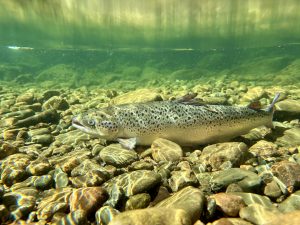I am responding to the June 17th editorial ‘By common sense, aquaculture is not eco-friendly’ and would like to clarify a few points raised.
The New Brunswick salmon farming industry, with the full support of both federal and provincial governments, is conducting trials on a new treatment for sea lice control called AlphaMax®. AlphaMax® went through a scientific review, with a risk assessment on both
health and environmental impacts before receiving approval for limited use by the Pest Management Regulatory Agency. AlphaMax® is licensed in Norway, the EU and Chile
where it has gone through the appropriate approval processes.
The active ingredient in AlphaMax® is deltamethrin which is registered for use in Canada in the agriculture sector. The trials entail an extensive monitoring, surveillance and research
program developed in collaboration with the province, DFO, Health Canada, PMRA, Environment Canada and the New Brunswick Salmon Growers Association. The research studies will ensure that the concentration of the deltamethrin in the water does not exceed
target dosages of 3 parts per billion, determine what if any, concentrations remain 12 hours after release and ensure early warnings of any potential adverse effects on the environment. There are also studies being conducted on potential impacts of the therapeutant on non-target species such as lobster and mussels, in the water column and on or near the benthos.
The industry is seeking additional treatment options to support an integrated pest management approach which will help to ensure that all treatments will deliver optimal results and to prevent resistance to any one product.
Meetings have been held with area stakeholders to explain this activity and we will meet with them again as soon as we have interim results available from the research.
The salmon farming industry in New Brunswick has changed its operational practices significantly since it began in the 1970’s. Nitrogen and phosphorus are monitored on an on- going basis during operations and farms would be shut down if they exceeded allowable limits. Farms are fallowed on a regular basis as an additional safeguard. Salmon farmers know it is critical to safeguard the ecosystem where their fish are grown – it’s not only the responsible thing to do, it just makes good business sense.
Finally, having been involved in the WWF Salmon Dialogues I’m surprised to read that they have developed screening criteria for standards – to my knowledge they are still collecting
the data necessary to develop those standards with eco-labeling standards not due until 2010.
To learn more about the AlphaMax® trials visit the NBSGA website at www.nbsga.com.
